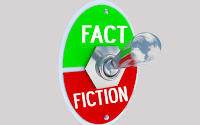Dishonesty or Fantasy: Which One Is Your ASD Child Engaging In?
“I catch my son (age 4, level 1 autistic) in a lie quite often. But when I confront him and try to get to the truth of the matter, he will vehemently insist that he is NOT lying. Arguing with him over the particular issue at the time is both exhausting and pointless. So, when he gets punished for lying, it has no lasting benefit (since he evidently doesn’t believe he has lied). So here we go again with yet another lie. I’m lost on what to do here. He’s either an expert at deceit, or blind to what the truth is and what fiction is. Any suggestions on how to handle this will be greatly appreciated.”
Children with High-Functioning Autism (HFA) and Asperger’s (AS) often confuse their parent by the quantity/quality of their dishonesty and by the fact that traditional disciplinary methods don't change the behavior. For young people on the spectrum, it will be helpful for parents to think less in terms of “dishonesty” and more in terms of "fantasizing" (i.e., the child will say what he wants to be true, rather than what is really true).
Fantasizing disguised at lying happens for several reasons. Here are just a few:
1. The “parent-pleaser” factor: The HFA or AS child knows that the truth may make his parents angry, and he wants to please them. If he has done something wrong (e.g., due to impulsivity, compulsive behavior, self-protective behavior, language processing problems, motor planning problems, etc.), he may try to make it right by telling his parents what he thinks they want to hear.
2. The “lack of awareness” factor: The child simply doesn't know what is true. If she behaves impulsively, she may not have an awareness of what she has done. Also, if she has problems with language processing, she may not understand what was asked or expected.
3. The “confusing reality with fiction” factor: The child can’t distinguish between wishful thinking and reality. What is objective to the parents may be subjective to him. If one truth is as good as another, he may select the one that seems (in his mind) to best fit the situation.
4. The “inability to predict cause-and-effect” factor: The HFA or AS child can't forecast the outcomes of her behavior. For example, she throws a rock and breaks a window. Her blameworthiness in the act seems clear-cut to the parents. However, if the child has trouble with the relationship between cause and effect, she may not be able to make the connection between throwing a rock and breaking a window. In her mind, intentionality is a factor. In other words, if she didn't intend to do it, she didn't do it.
5. The “it’s true for me” factor: The child is telling “his” truth. Due to his disorder, he often experiences the world very differently as compared to his parents. But, that does not make his experience “false.” If he persistently, frantically clings to an assertion that the parents feel is false (e.g., the water is too hot, this chore is too hard, my toy can't be found, etc.), parents should ask themselves if it might be only false to them.
==> Parenting System that Significantly Reduces Defiant Behavior in Teens with Aspergers and High-Functioning Autism
6. The “anxiety” factor: The child is stressed. If parents know that their youngster can't think calmly and clearly when stress levels are high, then they shouldn’t be surprised if they see a lot of senseless, immovable dishonesty in that situation.
7. The “it’s my way to contribute to the conversation” factor: The child is simply trying to join in the discussion. If she has limited life experiences or a limited vocabulary, she may want to have something to say, but no real contribution to make. Coming up with a tale (however imaginary or fabricated) may seem to her like the only way to participate.
If the HFA or AS youngster has genuine “special needs” that leads him or her to tell “wishful half-truths” rather than the real truth, parents should think carefully before handing out punishment for dishonesty. Of course, the youngster needs to know that he/she should be honest at all times, but if the dishonesty is not deliberate, punishment teaches nothing.
When parents catch their youngster being “dishonest” (in their mind), they should ask themselves if the child is doing so with malice and intent. If not, they should try putting more honesty in their child’s fantasizing. Tell the child what you think happened instead of demanding an explanation. If he says, "I don't know," then take that as an honest answer. Stay as composed and rational as possible when getting to the truth of the situation. Respect your youngster's reality, and be open to negotiation. Also, tell more truth than fiction yourself.
How can you tell if your HFA or AS child is being dishonest, or simply fantasizing?
Pay close attention to your youngster's behavior, and you should be able to tell if he or she is being dishonesty. For example:
1. Watch the body language. Kids who are being dishonesty are more likely to appear nervous and defensive (e.g., hunched shoulders, stiff body or face, repeatedly touching the nose or mouth, avoiding eye contact, etc.). The child who is nervous when telling a particular story may be fibbing.
2. Look at your child’s facial expression. The child who is telling the truth has a relaxed face that usually shows an emotion that matches what she is saying. However, if she is being dishonest, her face may show anxiety caused by knowing that she is fibbing.
3. Stories that are made up often contain inconsistencies or elements that don't make sense. Parts of the story may not sound believable. If parents suspect that their child is being dishonest, they can ask him to repeat what he just said. Honest stories told two times in a row will usually be the same, but stories that contain lies often change dramatically or contain accounts that can’t both be true.
4. Decide whether or not your child’s story sounds rehearsed or spontaneous. Kids who are being honest will usually tell it "off the cuff" (i.e., the story will sound like a fresh recounting of an actual event). Conversely, a fib may sound stilted or rehearsed. Some kids may even repeat the exact same phrase when telling a rehearsed story the second time.
==> Parenting System that Significantly Reduces Defiant Behavior in Teens with Aspergers and High-Functioning Autism
How to help the HFA or AS child who DOES lie:
Children with High-Functioning Autism (HFA) and Asperger’s (AS) often confuse their parent by the quantity/quality of their dishonesty and by the fact that traditional disciplinary methods don't change the behavior. For young people on the spectrum, it will be helpful for parents to think less in terms of “dishonesty” and more in terms of "fantasizing" (i.e., the child will say what he wants to be true, rather than what is really true).
Fantasizing disguised at lying happens for several reasons. Here are just a few:
1. The “parent-pleaser” factor: The HFA or AS child knows that the truth may make his parents angry, and he wants to please them. If he has done something wrong (e.g., due to impulsivity, compulsive behavior, self-protective behavior, language processing problems, motor planning problems, etc.), he may try to make it right by telling his parents what he thinks they want to hear.
2. The “lack of awareness” factor: The child simply doesn't know what is true. If she behaves impulsively, she may not have an awareness of what she has done. Also, if she has problems with language processing, she may not understand what was asked or expected.
3. The “confusing reality with fiction” factor: The child can’t distinguish between wishful thinking and reality. What is objective to the parents may be subjective to him. If one truth is as good as another, he may select the one that seems (in his mind) to best fit the situation.
4. The “inability to predict cause-and-effect” factor: The HFA or AS child can't forecast the outcomes of her behavior. For example, she throws a rock and breaks a window. Her blameworthiness in the act seems clear-cut to the parents. However, if the child has trouble with the relationship between cause and effect, she may not be able to make the connection between throwing a rock and breaking a window. In her mind, intentionality is a factor. In other words, if she didn't intend to do it, she didn't do it.
5. The “it’s true for me” factor: The child is telling “his” truth. Due to his disorder, he often experiences the world very differently as compared to his parents. But, that does not make his experience “false.” If he persistently, frantically clings to an assertion that the parents feel is false (e.g., the water is too hot, this chore is too hard, my toy can't be found, etc.), parents should ask themselves if it might be only false to them.
==> Parenting System that Significantly Reduces Defiant Behavior in Teens with Aspergers and High-Functioning Autism
6. The “anxiety” factor: The child is stressed. If parents know that their youngster can't think calmly and clearly when stress levels are high, then they shouldn’t be surprised if they see a lot of senseless, immovable dishonesty in that situation.
7. The “it’s my way to contribute to the conversation” factor: The child is simply trying to join in the discussion. If she has limited life experiences or a limited vocabulary, she may want to have something to say, but no real contribution to make. Coming up with a tale (however imaginary or fabricated) may seem to her like the only way to participate.
If the HFA or AS youngster has genuine “special needs” that leads him or her to tell “wishful half-truths” rather than the real truth, parents should think carefully before handing out punishment for dishonesty. Of course, the youngster needs to know that he/she should be honest at all times, but if the dishonesty is not deliberate, punishment teaches nothing.
When parents catch their youngster being “dishonest” (in their mind), they should ask themselves if the child is doing so with malice and intent. If not, they should try putting more honesty in their child’s fantasizing. Tell the child what you think happened instead of demanding an explanation. If he says, "I don't know," then take that as an honest answer. Stay as composed and rational as possible when getting to the truth of the situation. Respect your youngster's reality, and be open to negotiation. Also, tell more truth than fiction yourself.
How can you tell if your HFA or AS child is being dishonest, or simply fantasizing?
Pay close attention to your youngster's behavior, and you should be able to tell if he or she is being dishonesty. For example:
1. Watch the body language. Kids who are being dishonesty are more likely to appear nervous and defensive (e.g., hunched shoulders, stiff body or face, repeatedly touching the nose or mouth, avoiding eye contact, etc.). The child who is nervous when telling a particular story may be fibbing.
2. Look at your child’s facial expression. The child who is telling the truth has a relaxed face that usually shows an emotion that matches what she is saying. However, if she is being dishonest, her face may show anxiety caused by knowing that she is fibbing.
3. Stories that are made up often contain inconsistencies or elements that don't make sense. Parts of the story may not sound believable. If parents suspect that their child is being dishonest, they can ask him to repeat what he just said. Honest stories told two times in a row will usually be the same, but stories that contain lies often change dramatically or contain accounts that can’t both be true.
4. Decide whether or not your child’s story sounds rehearsed or spontaneous. Kids who are being honest will usually tell it "off the cuff" (i.e., the story will sound like a fresh recounting of an actual event). Conversely, a fib may sound stilted or rehearsed. Some kids may even repeat the exact same phrase when telling a rehearsed story the second time.
==> Parenting System that Significantly Reduces Defiant Behavior in Teens with Aspergers and High-Functioning Autism
How to help the HFA or AS child who DOES lie:
- Always model “telling the truth.”
- Avoid lectures and quick irrational decisions (e.g., “If you lie again, you'll be grounded to your room for a week!”).
- Do not accept excuses for lying. Lying is never acceptable.
- HFA and AS kids need to understand the hurtful consequences of lying, and when possible, should apologize for it.
- Kids often lie to keep their parent happy. Thus, they need to know that the parent values the truth much more than a small act of misbehavior.
- Let your child know that you are disappointed in his behavior, but bring him up before you bring him down (e.g., "It’s not like you to lie about your homework, you're usually very good at getting things done and staying on top of things").
- Logical consequences need to be in place for lying.
- Praise the truth! Catch your child telling the truth at a time when you know she would like to sugar-coat a situation.
- Role-play the potential devastating consequences of lying.
- The child should be part of the solution and/or the consequences. Ask her what she is prepared to give - or do - as a result of the lie.
- Through role-playing, teach your youngster the value of telling the truth.
- Give a warning regarding future instances of lying. For example, “In the future, if you choose to lie, you will also choose the consequence, which is __________ (fill in the blank with an appropriate consequence, such as the loss of a valued privilege).”
When dealing with HFA and AS children, it’s important for parents to understand the difference between “The Truth” and “subjective truth.” Much of the time, parents of special needs kids are dealing with the latter. Something that parents may consider as true may not necessarily be considered true by their child – and vice-versa. So, when you are uncertain whether or not your youngster is being honest, don’t simply jump to conclusions and accusations. Investigate first! See if you can figure out how - and why - your child is “making sense” in the way he or she is.
More resources for parents of children and teens with High-Functioning Autism and Asperger's:
==> How To Prevent Meltdowns and Tantrums In Children With High-Functioning Autism and Asperger's
==> Parenting System that Significantly Reduces Defiant Behavior in Teens with Aspergers and High-Functioning Autism
==> Launching Adult Children with Asperger's and High-Functioning Autism: Guide for Parents Who Want to Promote Self-Reliance
==> Teaching Social Skills and Emotion Management to Children and Teens with Asperger's and High-Functioning Autism
==> Parenting Children and Teens with High-Functioning Autism: Comprehensive Handbook
==> Unraveling The Mystery Behind Asperger's and High-Functioning Autism: Audio Book
==> Parenting System that Reduces Problematic Behavior in Children with Asperger's and High-Functioning Autism



